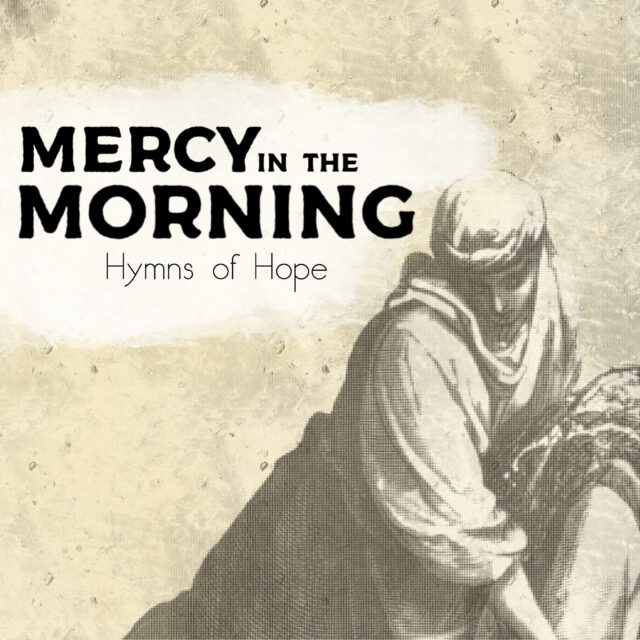
“The Meditation of Heaven”
Isaac Watts
My thoughts surmount these lower skies,
And look within the veil,
There springs of endless pleasure rise,
The waters never fail.
There I behold, with sweet delight,
The blessed Three-in-One;
And strong affections fix my sight
On God’s incarnate Son.
His promise stands for ever firm;
His grace shall ne’er depart;
He binds my name upon his arm,
And seals it on his heart.
Light are the pains that nature brings;
How short our sorrows are,
When with eternal future things,
The present we compare!
I would not be a stranger still
To that celestial place,
Where I forever hope to dwell,
Near my Redeemer’s face.
It never ceases to amaze me how just a few stanzas could be so jam-packed with the truth of the Scriptures. As the name of the hymn suggests, we are invited to peer into the absolute majesty of that faraway land called heaven, wherein sits our Hope and Redeemer at the right hand of his Father. How could we possibly exhaust all there is to write and say and think of that wonderful Subject of our faith and affections, especially in this scene that Isaac Watts presents to us? Fortunately, he spares us the frustration of that impossibility and instead picks a few (but definitely not least!) sweet truths from that tree of life, as it were—those reminders of the reality of heaven.
First, we enter these thoughts on heaven through Christ’s righteous atonement, which tore away the heavy partition or veil separating us from the Father. When God instituted the laws concerning sacrificial atonement, the holy of holies was the room in the tabernacle that housed, among other sanctified items, the mercy seat of the ark of the covenant, signifying the very presence of God. Only the high priest was permitted to enter, and only once a year at that. During that annual event, the high priest would offer a sacrifice in the holy of holies for the sins of all the Israelites, thus acting as a mediator between God and his people. This event was known only to him and God, however, there was a veil that separated the holy of holies from the rest of the tabernacle. When Christ “became sin for us,” his sacrifice rent that veil (Matt. 27:51), rendering it void, for now Christ has become that mediator and allowed all to approach the throne of grace. This is exactly why the author of Hebrews invites us, saying, “Having therefore, brethren, boldness to enter into the holiest by the blood of Jesus, By a new and living way, which he hath consecrated for us, through the veil, that is to say, his flesh; And having an high priest over the house of God; Let us draw near with a true heart in full assurance of faith, having our hearts sprinkled from an evil conscience, and our bodies washed with pure water” (Heb. 10:19-22). That “pure water” is none other than the living water that Christ offered to the Samaritan woman at the well in John 4. Now let’s take a closer look within that veil.
Next, Watts points our attention to God himself, the Three-in-One. While I won’t get into the specifics of the doctrine of the Trinity here (check out Heath’s recent article on the subject, “An Introduction to the Trinity”), I will pause on the fact that Watts finds a sweet delight in its truth. Here, we have the Father in his radiance and glory, yet not austere to the point of being unapproachable. On the contrary, the Father is more than deeply interested in the well-being of his children (Matt. 10:29-31), and he shows that love and care through innumerable and unknowable ways. At his right hand rests the only begotten Son of God, of whom John the Baptizer bears record that “we beheld his glory, the glory as of the only begotten of the Father,) full of grace and truth” (John 1:14). This is the Word, who was with God and was God from the beginning (John 1:1-2), and who was made flesh so that he could die in our place for our sins (John 1:14). And within each and every one of us believers is the Holy Spirit, who comforts, guides, counsels, convicts, and fights for our hearts and minds within every moment of every day (John 14:26, Gal. 5:17). While I have barely scratched the surface of God and his three Persons, I think it is more than enough to understand why Watts found such delight upon thinking of him, and why we can join him in his joy. Most of all we can join him in his affections which fix his eyes on that precious Jesus, God in the flesh.
In the third stanza, we are reminded that “his promise stands forever firm.” “Which promise?” you may ask. Every one of them, from the first to the last. I’m reminded of Paul’s opening words to Titus, in which he says, “In hope of eternal life, which God, that cannot lie, promised before the world began” (Titus 1:2). He alone can keep any and every promise he ever makes, including the one in which he said, “I will never leave thee, nor forsake thee” (Heb. 13:5). Of course, then, “his grace shall ne’er depart!” How often are we tempted to despair that he will run out of grace to give to his children? Instead, we read, “But he giveth more grace. Wherefore he saith, God resisteth the proud, but giveth grace unto the humble” (James 4:6). The last two lines of this stanza are rather interesting. He is referencing the Song of Solomon, in which he writes, “Set me as a seal upon thine heart, as a seal upon thine arm: for love is strong as death; jealousy is cruel as the grave: the coals thereof are coals of fire, which hath a most vehement flame” (Sol. 8:6). The context is the passionate words of a lover to his beloved. How fitting, then, that he should apply them to the love of Christ toward his bride, the church.
In the next article for “Mercy in the Morning,” I’ll be finishing up thoughts and devotions from this hymn’s last two stanzas (there really is a lot to unpack!). I hope that this has encouraged you to meditate on the reality of heaven and the One who inhabits it.

Carl is the editor of The Poking Stick and a contributor. He is a lover of music and languages. Carl is a connoisseur of donut shops and sausage rolls, and maybe someday he will get that Charlie Parker record. He is currently earning an MA in Vocal Performance.